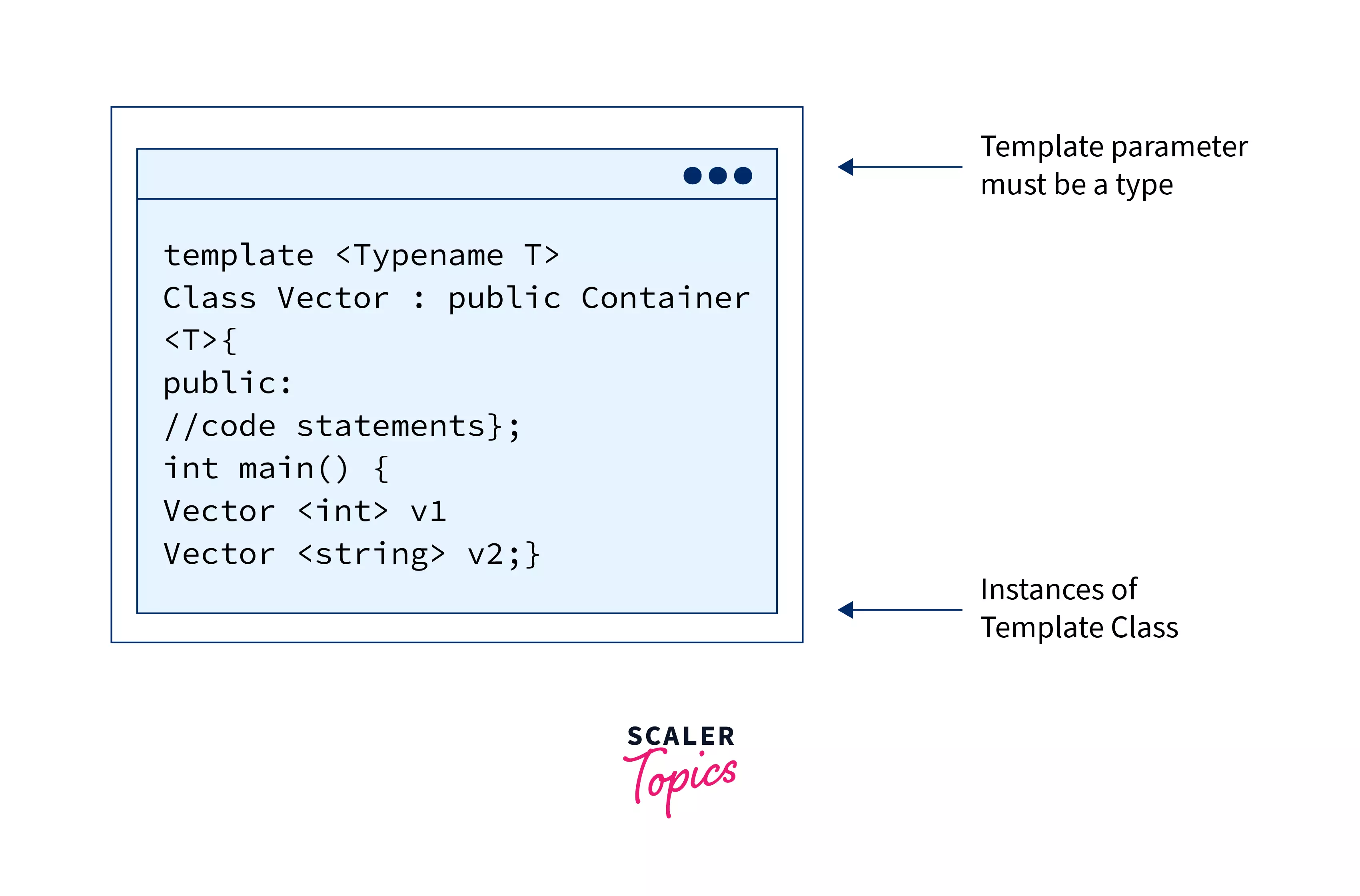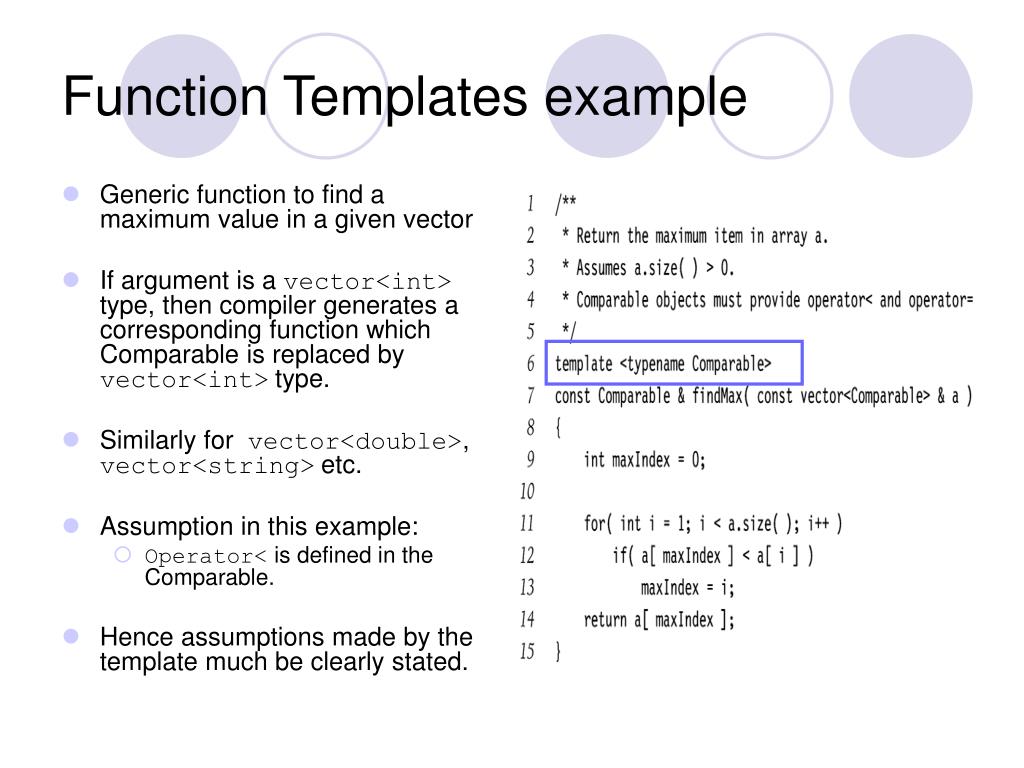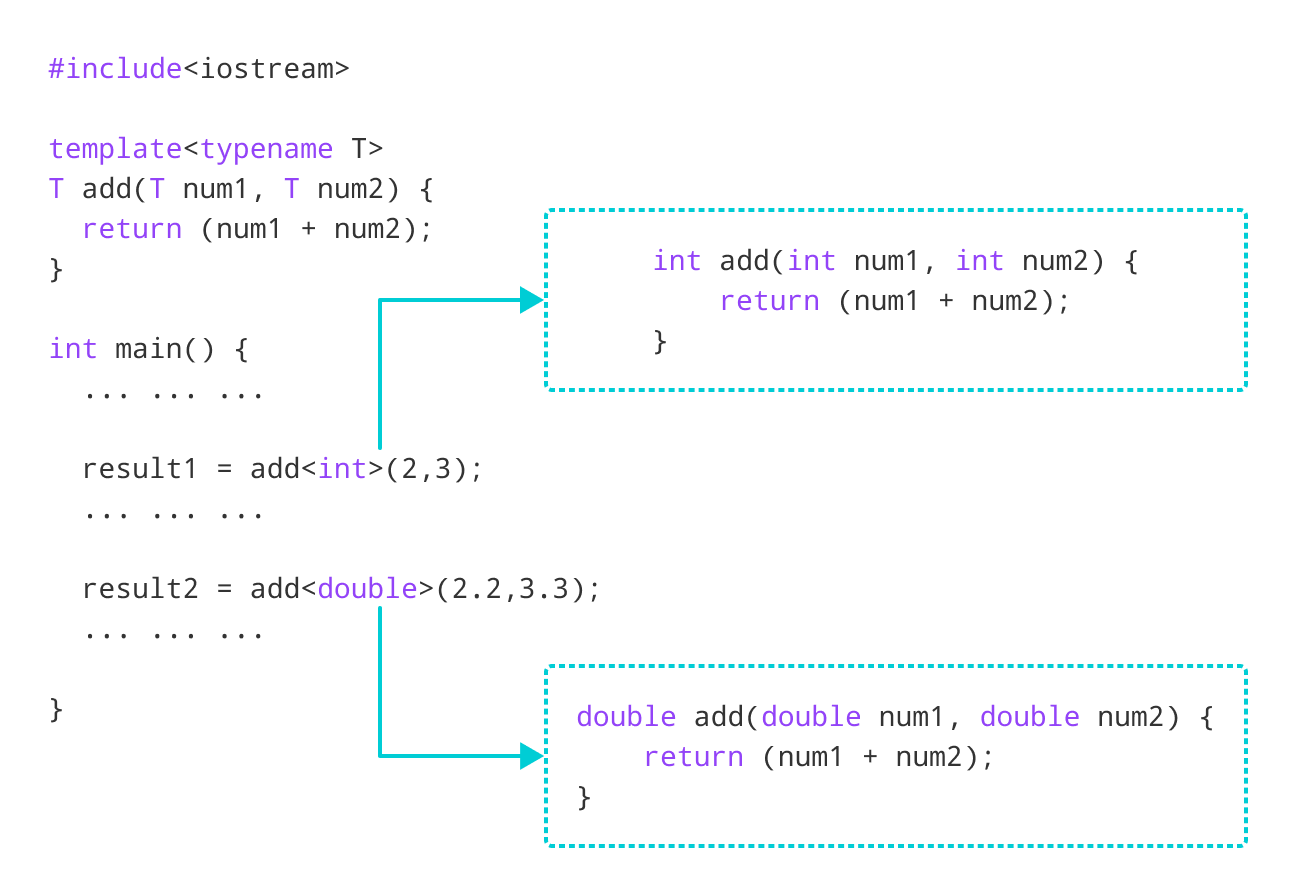C Template Function
C Template Function - The root of our problem is that we’ve only defined the single template type (t) for our function template, and then specified that both parameters must be of this same type. For example, to define a simple function that returns twice its argument: Web i think the closest you can get in c to templates is some ugly macro code. Web write your template code, using placeholder names, with a template name such as code.template.c. T doubler_##t(t x) { \. Web std::function<int(float, bool)> if i declare the function as: For class templates, the arguments are either explicitly provided, deduced from the initializer, (since c++17) or defaulted. How will we do this? It would be an ordinary syntax to define function's templated types: Web a function template defines a family of functions. Web std::function<int(float, bool)> if i declare the function as: T doubler_##t(t x) { \. Export was an optional modifier which declared the template as exported (when used with a class template, it declared all of its members exported as well). An alias to a family of types (alias template) (since c++11) a family of variables (variable template) (since c++14) For this example, we'll be creating a generic vector using this macro templating mechanism. Files that instantiated exported templates did not need to include their definitions: A family of functions (function template), which may be member functions. The following function template swaps two items: Web a template is a c++ entity that defines one of the following: Web function templates with multiple template type parameters. Web when used together with explicit class instantiation, the boost concept check library (bccl) can help you generate template function code in cpp files. Web i think the closest you can get in c to templates is some ugly macro code. The root of our problem is that we’ve only defined the single template type (t) for our function template, and then specified that both parameters must be of this same type. For example, to define a simple function that returns twice its argument: An alias to a family of types (alias template) (since c++11) a family of variables (variable template) (since c++14) Template class function {}; A family of classes (class template), which may be nested classes. T doubler_##t(t x) { \. Don't worry, you're not dyslexic. // function_templates1.cpp template< class t > void myswap( t& a, t& b. Web a template is a c++ entity that defines one of the following: How will we do this? // function_templates1.cpp template< class t > void myswap( t& a, t& b. Files that instantiated exported templates did not need to include their definitions: For class templates, the arguments are either explicitly provided, deduced from the initializer, (since c++17) or defaulted. It would be an ordinary syntax to define function's templated types: Web i think the closest you can get in c to templates is some ugly macro code. Export was an optional modifier which declared the template as exported (when used with a class template, it declared all of its members exported as well). You may be asking this question. Web a function template defines a family of functions. An alias to a family of types (alias template) (since c++11) a family of variables (variable template) (since c++14) Web when used together with explicit class instantiation, the boost concept check library (bccl) can help you generate template function code in cpp files. Web function templates with multiple template type parameters.. Web function templates are similar to class templates but define a family of functions. Web i think the closest you can get in c to templates is some ugly macro code. Template class function {}; // function_templates1.cpp template< class t > void myswap( t& a, t& b. Web a template is a c++ entity that defines one of the following: It would be an ordinary syntax to define function's templated types: Web function templates with multiple template type parameters. For example, to define a simple function that returns twice its argument: A family of functions (function template), which may be member functions. Files that instantiated exported templates did not need to include their definitions: The root of our problem is that we’ve only defined the single template type (t) for our function template, and then specified that both parameters must be of this same type. Export was an optional modifier which declared the template as exported (when used with a class template, it declared all of its members exported as well). For this example,. The root of our problem is that we’ve only defined the single template type (t) for our function template, and then specified that both parameters must be of this same type. Web a function template defines a family of functions. But it works with strange trick with partial template specialization. Web function templates are similar to class templates but define. It would be an ordinary syntax to define function's templated types: How will we do this? For class templates, the arguments are either explicitly provided, deduced from the initializer, (since c++17) or defaulted. Export was an optional modifier which declared the template as exported (when used with a class template, it declared all of its members exported as well). The. Files that instantiated exported templates did not need to include their definitions: Web a template is a c++ entity that defines one of the following: Web function templates with multiple template type parameters. For class templates, the arguments are either explicitly provided, deduced from the initializer, (since c++17) or defaulted. Web i think the closest you can get in c. T doubler_##t(t x) { \. The root of our problem is that we’ve only defined the single template type (t) for our function template, and then specified that both parameters must be of this same type. Web function templates are similar to class templates but define a family of functions. For this example, we'll be creating a generic vector using. Web std::function<int(float, bool)> if i declare the function as: The root of our problem is that we’ve only defined the single template type (t) for our function template, and then specified that both parameters must be of this same type. How will we do this? The following function template swaps two items: An alias to a family of types (alias template) (since c++11) a family of variables (variable template) (since c++14) You may be asking this question to yourself. Web a function template defines a family of functions. Web templates in c. For this example, we'll be creating a generic vector using this macro templating mechanism. Web a template is a c++ entity that defines one of the following: For class templates, the arguments are either explicitly provided, deduced from the initializer, (since c++17) or defaulted. Template class function {}; Don't worry, you're not dyslexic. // function_templates1.cpp template< class t > void myswap( t& a, t& b. Web write your template code, using placeholder names, with a template name such as code.template.c. Export was an optional modifier which declared the template as exported (when used with a class template, it declared all of its members exported as well).C++ Template Function & how to use template in c++ programming
C++ program to create a template function for bubble sort and
Templates in C++ With Examples Scaler Topics
C Template function in C Return Type? YouTube
Template in C++(with examples) Coding Ninjas
Chapter 3 Templates in C Template function in
Function Template in C++ Part 2 YouTube
Function Templates C++
C++ Function Template (With Example)
C++ Templates Function Template YouTube
Web I Think The Closest You Can Get In C To Templates Is Some Ugly Macro Code.
It Would Be An Ordinary Syntax To Define Function's Templated Types:
For Example, To Define A Simple Function That Returns Twice Its Argument:
But It Works With Strange Trick With Partial Template Specialization.
Related Post:









